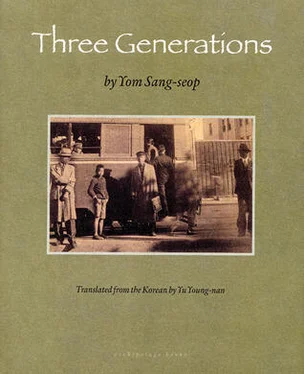Gyeong-ae’s father had been paroled because his condition was severe; indeed, it was terminal. Because of his advanced age, he suffered from multiple ailments, and though he saw some improvement shortly after his release, his condition soon took a turn for the worse under the pressures of poverty and the onset of winter. There wasn’t much Sang-hun’s doctor could do.
After New Year’s, his health declined even more. Administering medicine seemed only to hasten his death. Like a lamp drained of oil, he flickered and suddenly went out. In the end, he was considered fortunate just to be able to close his eyes in peace — even if it was in his brother-in-law’s house and not in his own home — rather than die alone in prison. Had he lived, he would have had to serve out his prison sentence, for there were forces jealous of his short life who would have insisted on it.
Both the pastor and Sang-hun were present at his deathbed. The dying man had no formal words to leave behind, but he was worried about his wife and daughter. He had good reason to trust Jo Sang-hun. Although they hadn’t been acquainted for long, he found Sang-hun’s kindness overwhelming, and he was grateful for it. It was not easy to find such men in the world, even among the religious community.
“I’ve prayed that God would take me peacefully, without causing trouble to you and my family, and now that time has come. I am at peace with myself as I depart this world, but those who remain behind are still so troubled. I’m leaving behind my brothers, my comrades — our society. I’m leaving this child of mine. I’ve thought about what my legacy will be after sixty years of living, and all I really have is this child. I know that, in effect, I’m throwing her naked into the street by leaving her behind this way, and while I have no doubt that you will each do your best for the sake of society, please take good care of this child. I know I could never thank you from the grave, Mr. Jo, and I know it is shameless to ask this of you, but I would be eternally grateful if you could, when I die, take care of my wife and child. ”
The patient’s mind was clear until he drew his last breath. Amid prayers and blessings from all those gathered around him, he uttered this long-winded last testament in the moments before he died.
Sang-hun vowed that he would abide by his wishes as much as possible. The dead man would never know whether Sang-hun kept his vow, but those who had heard him became his witnesses. And God Almighty was, needless to say, a witness equal to a million mortals.
The funeral held in Seoul was a propitious mourning, well attended and well subsidized by devoted members of the church, those connected to the school in Suwon, and other influential personalities. Sang-hun assumed the role of the funeral committee director and offered fifty won for expenses. The public ceremony was held at _____Church, but for the traditional funeral service the casket was transported all the way to Suwon, where he was buried in his family plot.
After the funeral expenses were paid, between five and six hundred won in donations were left over. During his lifetime, Gyeong-ae’s father and his family had had a hard time coming up with even a handful of rice or a bundle of firewood. The deceased had invested all of his assets in institutions for social progress and education.
It was decided that the five hundred won should be used as capital, rather than for the family’s everyday expenses. After consulting with Sang-hun, Gyeong-ae’s mother decided to rent a small house using this capital as the deposit, because it made no sense to squander it on trivial purchases. Besides, if Gyeong-ae and her mother continued living with her brother’s family, they would be expected to contribute their fair share toward the running of the household. It was Gyeong-ae’s mother who made the decision to leave; it was a heartless thing to do to her brother’s family, some of whom had no way of supporting themselves. She told her brother’s eldest son, who was doing nothing for a living, to take care of his own brood. The hope was that when Gyeong-ae graduated from school the coming spring, she would be able to provide for her mother and herself.
Sang-hun did his best to listen to their concerns and advise them how best to proceed. If they found a house to move into, he would supply them with food until Gyeong-ae graduated two months later and landed a job. The future of mother and daughter now looked considerably brighter.
They found a small rental property in Dangju-dong and moved in. In a sense, it was the dead man’s legacy, for it was thanks to him that they were able to live there. Yet it was also thanks to Sang-hun, for they wouldn’t have dared to make the move without his support.
“How can we ever repay Mr. Jo?” the mother said whenever the subject came up with her daughter.
As for Sang-hun, then as now, he lived on a monthly allowance from his own father — he wasn’t especially well-off. Still, he felt that he couldn’t simply abandon them as long as he had gotten involved, so he sent the family rice from his father’s mill on a regular basis. Actually, he sent far more than he needed to. He was not so extravagant that the mother and daughter could splurge on fancy sweets, but they were able to pay off accounts on fermented seafood and cooking oil with the leftover rice from his supply. Sang-hun continued to help the family, all quite sincerely, until Gyeong-ae graduated and started working at his school.
Sang-hun was not a merchant, nor had he mapped out a course of action. He wasn’t the type of person to be guided by an ulterior motive — by the expectation, as the saying goes, that people who have eaten salty food are bound to ask for water. On the contrary, since he had lived nearly forty years without knowing any worldly difficulties, he was easygoing and good-natured in his dealings with other people. He felt a certain measure of excitement about helping those in trouble, and when the recipients of his goodwill expressed their thanks profusely, he played along with equal enthusiasm. It was cruel to suggest, but one might be inclined to wonder whether he would have behaved the same way if the family didn’t have a daughter as lovely as Gyeong-ae.
In the church, people spoke highly of Sang-hun and praised his steadfast charity toward the family of the late patriot. Such words of praise, however, soon changed into jealousy and suspicion.
“Why does he have to visit them morning and night?”
“If he were as attentive to his parents, he’d be a model son.”
Women began to gossip about him. The truth was that although he went to pay respects to his father once a week, sometimes twice, he called on Gyeong-ae’s house, which was between the school and his own home, almost every day after work.
“Well, if it was just the old widow at home, it wouldn’t be much fun, but there’s the daughter, you know.”
When you have friends, you have enemies as well. Even the young teachers at school whispered such jokes among themselves.
After she graduated, Gyeong-ae had joined the school’s staff. Sang-hun, who still had strong ties to the school, recommended her. The faculty did not openly disapprove of this pretty new addition, but behind her back they exchanged knowing glances, rolling their eyes. New to the working world, Gyeong-ae detected nothing out of the ordinary.
Whenever she met Jo Sang-hun, Gyeong-ae treated him not only with respect and adoration, but also as her benefactor. Not only had he helped her father before and after his death, but she had grown to depend on Jo’s guidance. Her trust and love for him ran deep; she wouldn’t begrudge him if he were to ask her to die for him. Her mother also trusted him. For Gyeong-ae, the faith she invested in Sang-hun was like that of a girl toward her father, her brother, and her dearest friends — fused into one.
Читать дальше












